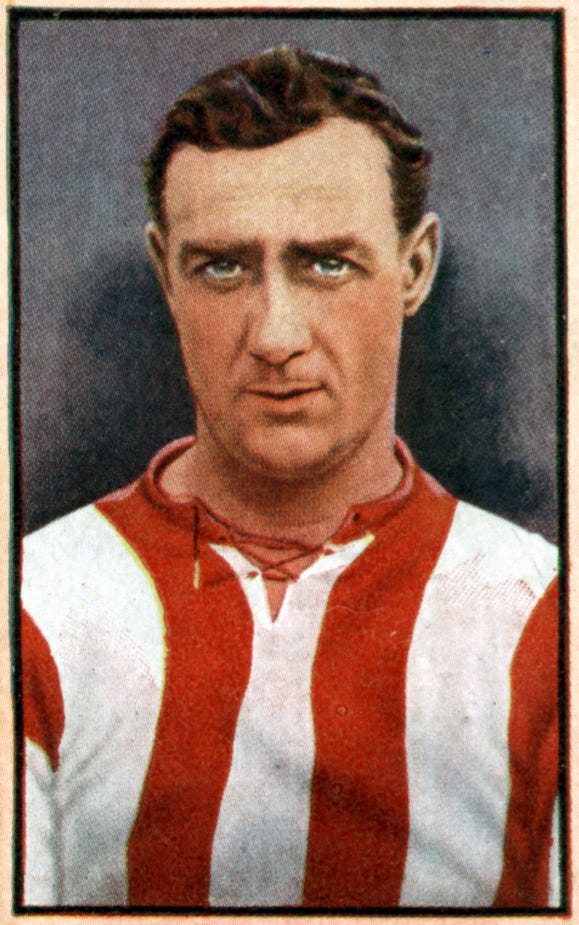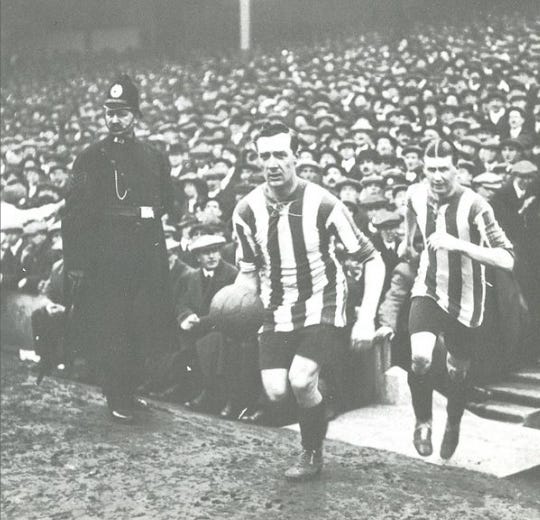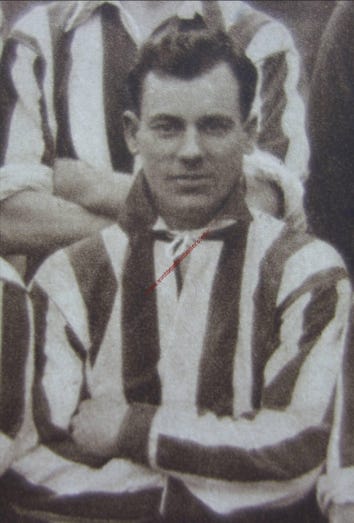Blades break the British transfer record...Twice
With the transfer window coming to a close, Matthew Bell takes us back in time to when the Blades spent the big bucks.
Words: Matthew Bell
The record fee for the transfer of a player between two British football clubs is not something commonly associated with Sheffield United FC. But perhaps it should be, considering that United have once broken it and once matched it. And, what’s more, both the players involved won the FA Cup with United.
The first £100 player is widely accepted to be Scottish half-back Willie Groves, who was sold by West Bromwich Albion to Aston Villa in 1893. Thereafter (according to Wikipedia) this fee was not surpassed until April 1899, when Everton paid Bury £400 for winger Jimmy Settle. Then (again according to Wikipedia), in October 1903 inside forward Benny Green was transferred from Barnsley to Small Heath (now Birmingham City) for £500. Meanwhile, in October 1901 Sheffield United had signed forward Alf Common from Sunderland for £325, which was obviously a sizeable fee at the time. Common scored United’s first goal in the 1902 FA Cup final win over Southampton, but in May 1904 he was sold back to Sunderland for £520. Less than a year later, Common was signed by Middlesbrough for a new British record fee of £1,000, thus becoming the first player to be sold for both £500 and £1,000. Common scored 24 goals in 79 league and cup games for United.
Wikipedia also states that the £1,000 record for Common’s transfer stood until November 1907, when Newcastle United bought Scottish outside left George Wilson from Everton for £1,600. Four years later, winger John Simpson was transferred from Falkirk to Blackburn Rovers for £1,800, a new record, then in November 1913 Sheffield United topped this by signing left half George Utley from Barnsley for £2,000. However, as (perhaps) with a few Wikipedia claims, this ‘fact’ is both true and disputable. The reason for this is that in January 1913 Blackburn Rovers signed forward Danny Shea from West Ham United for what the Daily Mail described as a price ‘stated to be a record’. A few days later the Mail defined the fee as £2,000, of which Shea personally received £550 – a tidy sum worth around £58,000 in 2023. At the same time the Mail proposed the abolition of the transfer system, calling it ‘a crime against the sport’. But that’s another story. Back to George Utley; when United signed him ten months after Shea’s move, the fee equalled the record, but it was still a record. £2,000 then is worth £210,000 today, which shows just how football transfer fees have risen so much faster than inflation in the intervening period.
The background to Utley’s signing is worth recalling. By 1913 Sheffield United’s star had fallen from the glory days of either side of the turn of the century when they won the League championship for the only time in the club’s history and reached three FA Cup finals, winning twice. They also were League runners-up in 1896/97 and 1899/1900, making it six consecutive seasons in which the players collected medals. But following the decline or departure of many players, including captain Ernest Needham, goalkeeper William Foulke, full back Harry Thickett and forwards Walter Bennett, Fred Priest and Bert Lipsham, the team rarely threatened to challenge for honours for the next decade, their highest league placing being fourth in 1906/07. There were also embarrassingly early exits from the FA Cup at the hands of Blackpool, Swindon Town and Darlington, all at Bramall Lane. First or second round cup defeats became the norm.
The arrival of a group of players, who were to serve United for many years, heralded a period that the club hoped would bring a repeat of earlier successes. Billy Gillespie (563 appearances), Albert Sturgess (512 appearances), Bill Brelsford (417 appearances), Joe Kitchen (342 appearances), Harold Gough (335 appearances), Bill Cook (324 appearances), Jimmy Simmons (301 appearances), George Utley (240 appearances), Bob Evans (220 appearances) and Stanley Fazackerley (143 appearances) all signed for United between 1907 and 1913.
The most important signing of the lot – and the most expensive – was Utley, who had played in two FA Cup finals for Barnsley: they lost to Newcastle United in a replay in 1910 and beat Everton in a replay at Bramall Lane in 1912. The Sheffield United directors liked what they saw and made an offer to his local club for his services. The Daily Mail of November 18th 1913 confirmed the amount offered: ‘It is said the acquisition of this player cost the Bramall-lane club £2,000. Utley is twenty-three years old and is a native of Elsecar, near Barnsley.’ Some directors were said to be of the view that no footballer was worth that sort of money (an opinion with which Utley himself agreed) and that Utley would never last the term of his agreed engagement. He proved them wrong, despite initially not being keen on the move because he was due a long-service benefit at Barnsley. A five-year contract and the promise of a benefit at the end of it were enough to sway him. Utley was also made captain. A commanding left half around whom the team revolved, his importance grew further when the team’s most skilful player, Billy Gillespie, broke his leg in September 1914. In Utley United had at last found an on-field leader and inspirational figure to replace the great ‘Nudger’ Needham, the ‘Prince of Half Backs’, who had retired several years earlier. Trainer George Waller said Utley was ‘a tower of strength, particularly in a cup tie, and a clever leader of men’.
With Utley a regular in the line-up, the 1913/14 season at last brought signs of recovery as United reached the FA Cup semi-final, losing 1-0 to Burnley in a replay at Goodison Park following a goalless draw at Old Trafford. The United team was now well stocked with players at or nearing their peak. United’s run to the semi-final brought in over £13,000 in gate receipts, more than enough to cover Utley’s transfer fee and wages. Such revenue also helped towards much-needed ground improvements at Bramall Lane. However, in later years Utley’s favourable contract terms caused unrest, even rebellion, in the United dressing room. His contract allowed him to take the entire gate receipts for one match as his benefit, a clause that was not available to other players. Choosing a game against Sunderland in 1920, which produced net takings more than twice the £500 other players received for their benefits, he was the last player in English professional football to enjoy such a tax-free perk.
We still haven’t mentioned Utley’s biggest achievement, which was to captain United to their 1915 FA Cup triumph. United played Bolton Wanderers at Ewood Park in the semi-final; a photograph shows Utley leading out his men, balancing a football on his right hand. Utley and his team took the field to face a hostile crowd numbering some 22,500, reported by the Sheffield Daily Telegraph to be ‘nineteen-twentieths in support of Bolton Wanderers’, but United overcame the partisan atmosphere to win 2-1.
They were to play Chelsea at Old Trafford in the final, prior to which Utley gave a big hint as to his team’s intended tactics, saying:
If we are foolish enough to make the mistake of trying to play Chelsea at their own game they will beat us. They are cleverer than we are, as far as pretty football is concerned, and if we allowed them to settle down to the Scottish style of attack they adopt we would be laying up trouble for ourselves. The game that we play best is the wide swinging variety, the type that wins cup ties as a rule, and because that is our natural game, and because it is probably the best paying game in cup ties we shall play it.
The ’Scottish style’ he mentioned referred to Chelsea’s preferred approach of making their way forward with a series of short passes. United, on the other hand, liked to be more direct, getting the ball quickly out to the wings and into the penalty area.
Another famous photograph, this one from the cup final, shows Utley, dark haired and of rugged appearance, shaking hands with his Chelsea counterpart Jack Harrow, also dark haired but of slighter build, and bandaged at the knee, as the match ball sits between them on the oversized centre spot. No pennants or mementoes are exchanged by the two cup final captains. Beside Utley the referee Mr H. H. Taylor stands attentively, his left hand in the pocket of his blazer, his shorts extending down below the knee. He looks no older than the two players. All around them the pitch surface is more rolled mud than grass.
These formalities were the prelude to an ultimately comfortable 3-0 win for United, a victory based on the commanding play of United’s half-backs, particularly Utley, whose influence was incalculable. Indeed, he was praised in the local press for his ‘omniscience’. He controlled Chelsea’s right wing, where Harry Ford, after an early injury inflicted by Utley, was ‘fairly mesmerised’ by United’s captain. Chelsea captain Harrow commented: ‘We lost to the better team on the day. They gave us no rest and little chance.’ Utley’s view was meanwhile concise and precise: ‘There was only one ball, and we had it most of the time.’ Overall, George Utley’s United career brought nine goals in 122 league and cup appearances (not including wartime).
Utley was the joint British record signing for just two months; in February 1914 forward Percy Dawson moved from Heart of Midlothian to Blackburn Rovers for £2,500. With the First World War causing the cessation of professional football immediately after United’s cup win, player transfers for money did not recommence until the 1919/20 season. Then, in March and May 1920 Birmingham City – who were in the Second Division at the time – twice broke the record, first signing Joe Lane from Blackpool for £3,650 and then Johnny Crosbie from Ayr United for £3,700. Birmingham finished third that season and won the Second Division title in 1920/21, but such a large outlay on two players didn’t really do them much good.
In November 1920 United were on the receiving end of a British record fee when they sold 1915 FA Cup winner Stanley Fazackerley to Everton for £4,000. A month later – believe it or not – United used this money and more to once again break the record by signing David Mercer from Hull City for £4,500. The Green ‘Un called the fee ‘stupendous’, whilst also reporting that ‘Hull folk are very disgusted over the Mercer transfer’. Despite the huge fee, Mercer, a stocky and tricky winger given the nickname ‘Dancing Master’, was not an immediate success. However, he stuck around and by 1925 had formed a contrasting wing partnership with Fred Tunstall, who was fast and direct and had a powerful shot in either foot. Both wingers were members of United’s 1925 FA Cup winning team; in fact, Tunstall scored the goal as United beat Cardiff City 1-0. This was, of course, United’s last major trophy – almost a century ago. Mercer left United in 1928 after scoring 22 goals in 241 league and cup appearances.
If there is a moral to this story, it is that if United are ever to win the FA Cup again, we must first break the record for a transfer between two British clubs. This currently stands at the £100,000,000 paid by Manchester City to Aston Villa for Jack Grealish, so don’t hold your breath!
Matthew Bell was editor of Sheffield United fanzine Flashing Blade from 1989 to 2019 and wrote a weekly column for the Green ‘Un and Sheffield Star newspapers between 1993 and 2015. He has also published several books on local history and the social history of sport.







That was really interesting, Matthew – thanks.
In the present day, when we know that football’s often “ruled by money”, a transfer fee of £325 seems as preposterous as the one for Jack Grealish!
It’s also interesting that the clubs with money, who were able to support these fantastical amounts were clubs that are still around today (even if not in the top flight) – West Brom, Aston Villa, Bury, Birmingham City, etc, as well as Sheffield United.
Thought provoking stuff, thank you.
Sue.
Great piece Matthew, a proper insight , funny as well. We need a George Utley now, a no nonsense hard man , with talent. A different world.
Thanks Brian